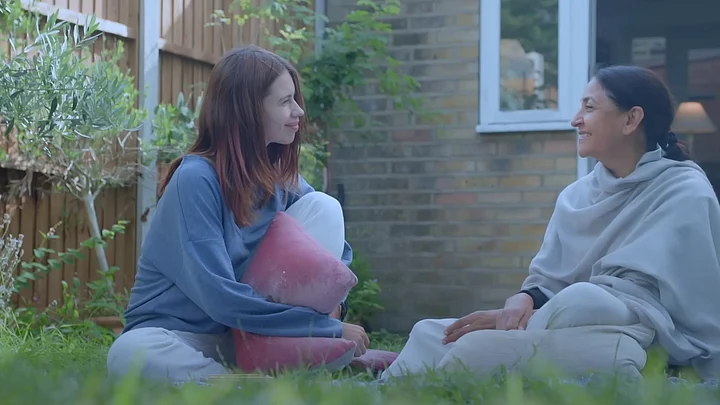Often adults of my family would tell the kids, “Someday the parents become children” (some of the sentimentality is perhaps lost in translation. For kids playing ‘house’, pretending that water with marigold petals is soup, this statement made no sense. Alas, it’s one of those sentences that makes more sense with age.
Goldfish, starring Deepti Naval and Kalki Koechlin, is a film that captures the poignant reminder of passing time. Anamika (Koechlin), her identity fractured between the British-born ‘Ana’ and the Indian daughter ‘Miku’, returns to her childhood home after a fire scare. Her mother Sadhana Tripathi (Naval) is in the early stages of dementia.
The film takes an interesting look into the relationship between caregivers and people in their care. By placing this conversation around the story of a mother and daughter who actively resent each other, despite perhaps obligatory affection, is a stroke of genius by writer-director Pushan Kripalani (and writers Pushan and Arghya Lahiri).
Indian cinema would have you believe that parents and elders should be placed on pedestals, their words and feelings held above all else. But films like Goldfish wade into more mature, nuanced waters of parenthood.
Anamika and Sadhana have been estranged for years – Ana sees this return to her childhood home as a one-top trip to ‘wrap things up’. She plans to send her mother to a care home, sell the house, and get a new job to fix her money problems. Very early on, her mother’s friend Laxmi Natrajan (Bharti Patel) tells her, “If this was India, she’d be with a joint family”.
That’s where the beating pulse of the film lies – in the intricacies of what and whom we consider ‘family’. The community Sadhana lives in views Ana as a stranger despite the fact that she is whom the world would automatically consider Sadhana’s ‘family’. And yet, neither mother nor daughter seem inclined to spend these days together.
It is but natural – Ana is the reminder of reluctant parenthood and Sadhana is a reminder of an abusive childhood. Who would be willing to reconcile with either truth? Children are, culturally, expected to take care of their parents when they grow older.
The title ‘Goldfish’ at first glance seems like an obvious metaphor for fading memory – ‘you have the memory of a goldfish,’ we often chide. But a goldfish is also an important part of a memory from Anamika’s past. It represents the feelings Anamika must deal with – does she, or rather must she, conform to the expectations society places upon her as the child of an ailing mother by forgetting her slights against her?
Kalki Koechlin portrays these myriad of emotions perfectly. Koechlin’s performance in Waiting (2015) has stayed with me all these years and her work in Goldfish is reminiscent of her expertise in tackling grief and loss as a subject.
Deepti Naval is beyond excellent as Sadhana. Her attachment to music, as a former Hindustani classical singer, is mirrored by her attempt to reconnect with her daughter through a language she doesn’t understand. When Sadhana laments, ‘the words are leaving me’, it is enough to drive one to tears. It is proof of the inimitable presence of Naval on screen that she can bring alive a character with such panache.
Your heart aches for the mother-daughter duo.
Kripalani’s filmmaking truly shines in the mundane details of his work. A Dictaphone Sadhana claims is for her music or the pictures she uses to remember the people she cares about, all factor into her grasping for a semblance of permanence in a terrifying time. The magic is in the way a fox seemingly visits Sadhana everyday but stops once her daughter is home.
Is that meant to signify that Anamika’s presence in Sadhana’s house is comforting or alienating? It’s up to you. Was the goldfish dead or alive? That is up to you too. Goldfish is not a film that is interested in giving black-and-white answers. Can there really ever be clear answers in dealing with grief, trauma, and bereavement?
The background score is subtle – the only moments of ‘loudness’ are either moments of joy or grief. The film is also bolstered by magnificent music, courtesy composer Tapas Relia. Ustad Rashid Khan and Pratibha Singh Bagel lend their voices to the evocative tracks. The music fills the house that is otherwise populated by a heavy silence.
And silence is where the film ends but it’s not one of suffocation that the film began with. Instead, this silence signals the beginning of a conversation between two women who had forgotten how to communicate.
(At The Quint, we question everything. Play an active role in shaping our journalism by becoming a member today.)
